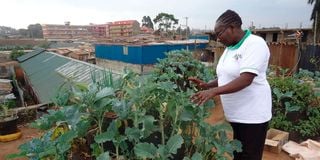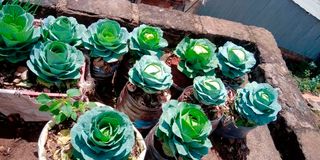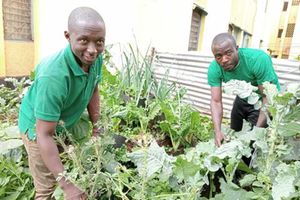
Jane Changawa at her sukuma wiki garden grown on a rooftop in Kawangware, Nairobi.
To thrive in Kenya’s capital, whose population continues to grow daily, one needs to be creative.
One resident of Kawangware has literally taken farming to new heights, transforming rooftop spaces to lucrative vegetable gardens.
Jane Changawa neither owns a house nor land in Nairobi but is a supplier of fresh vegetables to locals.
As a tenant, like millions of other Nairobians, the 57-year-old has educated and taken care of her four grandchildren with earnings from her rooftop vegetable farm.
Changawa got the idea of rooftop farming from an organisation that had introduced her to growing vegetables in sacks and pots.
She talked to five Kawangware house-owners to use their rooftops to grow vegetables in an effort to bring down the cost of living.
Weeks later, Changawa had transformed the first rooftop into a garden measuring 50 by 20 metres. She planted sukuma wiki, spinach and other vegetables.
“The first vegetables were just enough for my family. Little did I know how fast the venture would grow. Months later, I had begun supplying greengrocers with greens,” she says.
The earnings have ensured Changawa improves her sacco savings and pay school fees for her grandchildren.
“My sacco shares have increased, meaning I can take bigger loans than before and pay easily,” Changawa says.
Rooftop farming has become Changawa’s full-time job, She works closely with her husband Joseph.

Jane Changawa's cabbages that are ready for harvesting on her rooftop garden in in Kawangware, Nairobi.
“The vegetables go for as low as Sh100. I now have 10 sacks, having started with one,” she adds.
Apart from sack soil, Changawa has cones. A cone-shaped garden maximises vertical space, allowing more planting area in limited space.
Despite being a diabetic, Changawa works tirelessly at her rooftop farm.
“I was advised by doctors to consume more vegetables. It motivated me to look for more rooftop spaces and increase my yields,” she says.
The other challenge is getting water for her crops. Twenty litres of clean water in Kawangware cost Sh20.
“Even when we get the water, we pay someone Sh5 to carry a 20-litre container to the roof,” Joseph says.
“Things are worse in the dry season. We hope to acquire a 2,000-litre container soon.”
Changawa makes her own compost and pesticides for the vegetables.
“Farmers need to know that cilantro smell repels pests. I use kitchen waste like ugali, fruit peels and leaves to make pesticide. I put the waste in a plastic bag and seal it. It decomposes and produces black water, which becomes fertiliser and pesticide,” she says.
Joseph has also taken advantage of the available space to plant banana seedlings, which he expects to take to his rural home in Kilifi.
“In addition to vegetables and banana seedlings, we have maize,” says.
Her landlord, Geoffrey Mongare, says he was impressed by Changawa’s farming and added her more space. He, however, advised her to use plastic sheets to prevent water from seeping into the concrete.
Mongare says the rooftop gardens have improved the quality of air in the area.
“If one has a who doesn’t cause problems with rent, you cannot deny her such an opportunity,” Mongare says.
Changawa’s neighbour Christine Kariuki has been her customer for two years. The greengrocer gets most of her stock from Changawa.
Changawa urges city residents to use every available space for farming. This is especially important in densely populated areas where traditional farming is not feasible.
“Growing vegetables on rooftops ensures nutritious, pesticide-free produce. This leads to better diets and improved health outcomes,” she says.









